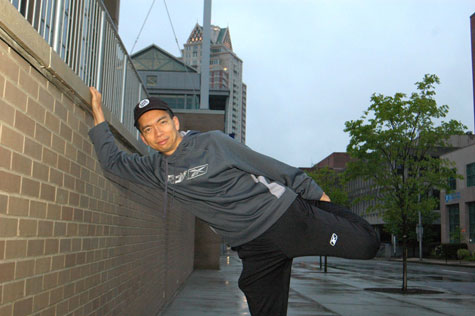
JOGGING WITH JOHN Maeda stretches out before a "runversation."
|
The Rhode Island School of Design, for all its artful ambition, is a conservative place. Students draw. They mold clay. They are awash in taxidermy.
So there was more than a little anxiety when John Maeda — sneaker designer, MIT professor, digital media rock star — took over as RISD president last summer.
Would the canvas yield to the computer? Would the easel give way to the electron? Would the cross-trainer supplant Cézanne?
A year later, it seems clear that the traditionalists have little to fear. Indeed, Maeda seems more enamored these days of what he calls "dirty hands" — the filthy work of ceramics or furniture-making — than of any high-tech pursuit.
"People don't want technology anymore," he said, in a recent interview. "They want humanity again."
But if Maeda, 42, has a healthy appreciation for the old, he is undoubtedly of the new. He blogs. Tweets. Presides over an "open-source administration" that encourages online critique.
He wears T-shirts to work. Repairs to the student cafeteria for lunch. Has a goofy penchant for rhyme. And every month or so, he makes his way downtown at 6 am for "Jogging with John," a "runversation" that has become a favorite among the Providence geekery.
Maeda is, in short, an experiment in leadership. An adventure in administration. And a year into his tenure at the nation's most prestigious school of art and design, no one is quite sure what to make of it all.
"Will it work, totally?" said Henry Ferreira, associate professor of printmaking and president of the faculty union. "I'm not sure."
That sort of uncertainty can be unnerving — especially amid a financial crisis. And RISD, like nearly every institution of higher education, is hurting.
The school's endowment has lost one-third of its value since peaking at $374 million in December 2007. And in recent weeks, Maeda announced he would lay off 15 to 20 workers and close the RISD Museum of Art for the month of August.
But if the campus is still sizing up its president, there is a palpable feeling of optimism about the new administration: a sense that Maeda could be a transformational figure for a transformational moment.
His predecessor, Roger Mandle, was a more conventional president. And by many measures, a successful one. During his 15-year tenure, Mandle grew the RISD endowment fivefold, swelled the faculty half-again, elevated the school's international profile, and expanded the school's campus into downtown Providence.
The Chace Center — a striking, $34 million museum and classroom space that opened on North Main Street last year — leant a sense of place to a campus with no real center (other than the so-called "RISD Beach," a small strip of grass at the corner of Waterman and Benefit streets).
But if Mandle's fundraising prowess and steady hand found support in some corners of the campus, there was also a deep strain of dissatisfaction — laid bare in 2006 when department heads cast a vote of no confidence in the president.
Critics complained of a top-down leadership style, an emphasis on real estate over academics, a lack of transparency around school finances. And those concerns hovered over the search for a new chief.
But there was also a sense that RISD needed a president who could come to grips with broader shifts in the worlds of art, design, and business: art gone viral; iPod as triumph of aesthetics, as much as technology; designer as the new corporate hero.
And Merrill W. Sherman, president and CEO of Bank Rhode Island and chairman of the RISD Board of Directors, said Maeda articulated the new reality in intriguing fashion during an interview.
The candidate conjured an image of MIT prior to World War II — a geeky outpost soon to be transformed by an explosion of science and technology — and argued that RISD was on the cusp of something similar.
"That got us very excited," Sherman said. "That got our attention."
FROM TOFU TO TECH
The son of a Seattle tofu-maker, Maeda grew up with an education in craftsmanship and devotion to task: his father, a Japanese immigrant, worked from 1 am to 6 pm.
"No staff," Maeda said. "He was the machine who moved all the parts around."
Maeda would retain an appreciation for the handmade as he got older. But he built a life in academia, collecting bachelor's and master's degrees in computer science and electrical engineering at MIT, a Ph.D. in design science at the more traditional University of Tsukuba Institute of Art and Design in Japan, and a master's of business administration at Arizona State University.
His early work in digital media design, now in the permanent collection of the Museum of Modern Art, still provokes a giddy response in the art world.
"Where John went early in his career, no one had been before," said Reed Kroloff, director of the Cranbrook Academy of Art in Michigan. "His work is amazing, groundbreaking, exciting, game-changing — take your pick of overused adjectives, they're all true."